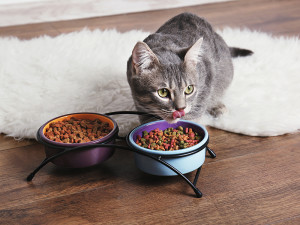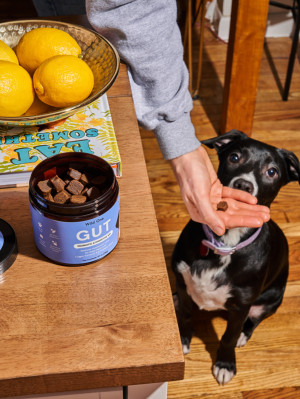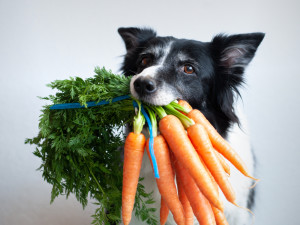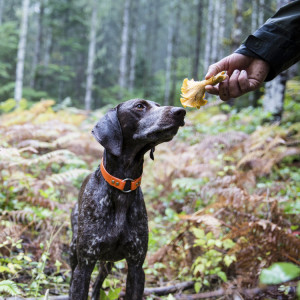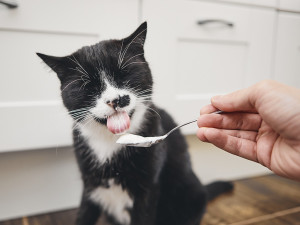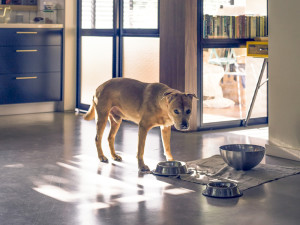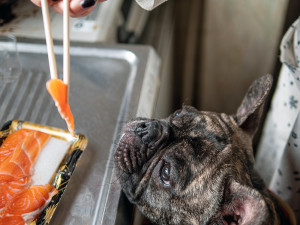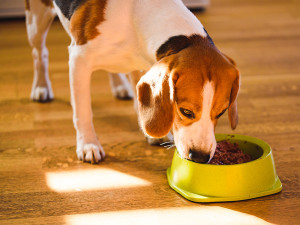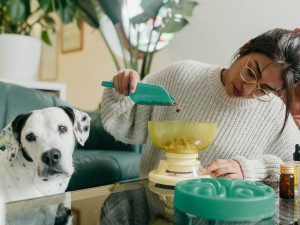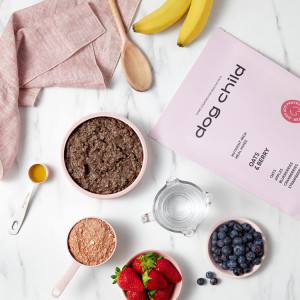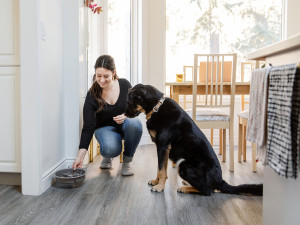Are Probiotics Actually Something Your Dog Needs?
Time for a (literal) gut check from four experts.
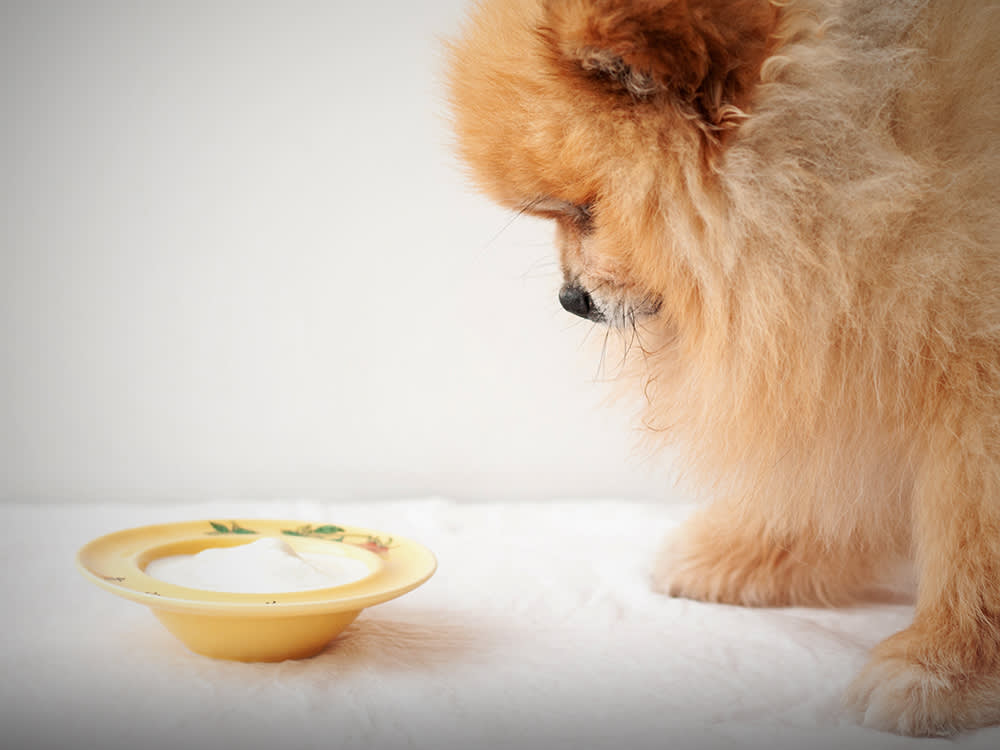
share article
If you haven’t heard about “gut health” these days, then you’re probably not on social media, getting slammed with various supplement ads or getting cornered at a dinner party by your friend who’s trying some new tea that’s “changed their life.” As annoying as that interaction might be, probioticsopens in a new tab, a broad group of over 400 microorganisms that support a robust, disease-free body, are a favorite in the human supplement world. And now, they’re omnipresent in pet stores, too. But are probiotics suitable and safe for dogs? Here, get the lay of this microflora landscape — and learn whether probiotics are a good idea for your dog.
Dog Probiotics 101
What are dog probiotics?
Dogs (and humans) are host to hundreds of different kinds of microbes, and per Dr. Mary Ellen Sanders, an internationally recognized leader in probiotic microbiology, that’s a good thing. In the canine gastrointestinal(GI) tract, probiotics promote health by “piggybacking on the important relationship between the normal immune system and microbes,” Dr. Sanders says. More specifically, Dr. Sanders suggests that probiotics increase “the activity and numbers of immune cells (or cytokines), whose job it is to attack invading pathogens.” When the immune system senses these microbes in the gut, it launches a response.
Are dog probiotics necessary for my pet’s nutrition?
Healthy dogs usually don’t always need a probiotic because their gut is able to maintain a healthy bacteria balance on its own. However, during times of stressopens in a new tab, illness, or malnutrition, their gut can become imbalanced, and probiotics can help.
When it comes to optimizing the use of probiotics, Dr. Robert Boyle, a clinical lecturer with the U.K.’s National Institute for Health Research, suggests that they work best as preventive agents. “Once disease is established, it is harder for [probiotics] to compete with pathogenic bacteria and processes that have already become established in the gut,” Dr. Boyle says. So, while your dog is healthy, it’s a good idea to get them started with a diet rich in good microflora.
What is the recommended dosage and frequency for administering dog probiotics?
The dosage and frequency for administering a canine probiotic depends on the product you are using; it will be labeled with dosage information. You can check with your vet about the specific dosage that’s best for your pet. If you’re feeding your dog natural probiotics, it’s recommendedopens in a new tab that you feed a teaspoon a day for small dogs, two for medium sized dogs, and three teaspoons a day for large dogs.
What are the benefits of probiotics for dogs?
Probiotics can produce antibacterial compounds called bacteriocins, which directly inhibit the body’s tolerance of pathogen growth. The plain-English version: Probiotics are the good bacteria that kick out the bad, and then make it harder for the bad actors to get back in the door. Probiotics help your dog digest their food, increase their absorption of nutrients, and boost their immune system, too.
How to incorporate probiotics in your dogs diet
Most over-the-counter supplements include strains of several common probiotic microorganisms — Bifidobacterium bifidum, Lactobacillus acidophilus, and Lactobacillus bulgaricus, for example — but the quality of these cultures varies wildly.
Some nutritionists suggest buying only refrigerated supplements, since the shelved strains may be dead by the time you get them home. The University of Toronto, however, published a studyopens in a new tab that, among other things, questioned the batch-to-batch consistency in all probiotics, and found that enthusiasm for their use “has been hampered, at least in part, by concerns about precisely how the various organisms purported as probiotics mediate their beneficial effects.” In other words, there were so many products on the market, with so many different “mechanisms of action,” that questions were raised about the efficacy of these products as a whole.
If you do buy supplements, it’s best to shop for whole-food, organic, refrigerated products. Be sure to check their expiration dates and buy from companies that provide laboratory assays or summaries of the drug potency.
Natural probiotics for dogs
It’s important to note that supplements aren’t your only option. Plenty of foods in your home contain probiotics naturally; probiotic foods for dogs include yogurtopens in a new tab, kefir, bananasopens in a new tab, honey, leeks, and Jerusalem artichokes.
Some pet parents, including C.J. Puotinen, author of The Encyclopedia of Natural Pet Careopens in a new tab, are so adventurous that they feed things like lacto-fermented vegetables, such as mild homemade sauerkraut or shredded carrots with ginger. (For the brave souls who wish to try offering fermented veggies, note that fennel seed is a natural remedy for flatulenceopens in a new tab).
Ultimately, you can work in any number of ways with a supportive veterinarian to come up with a safe, nutritious regime at home that takes gut health, and therefore probiotics, into account to feed your pup the best probiotic food for dogs. They may recommend green tripe, the nutrient-rich lining of the stomach of a ruminant animal such as a cow, deer (venison), or bison, which is loaded with beneficial bacteria and enzymes. Sticking with probiotic foods for dogs that are easily digested by your dog (such as green tripe) makes the addition of probiotics to your dog’s mealtime routine incredibly safe.
Finding your dog’s natural probiotic balance
So, you mindfully begin supplementing your dog’s diet, but their coat remains dull and their energy, sluggish. What could be going on? No matter how thoughtfully you use supplements, some dog foods, riddled with carbohydrates and fillers, can ruin our best efforts.
The sugars in these foods not only fail to protect your dog from harmful bacteria; they also nourish the very bacteria you’re trying to discourage. Dr. Jeannie Thomason, the co-founder of the American Council of Animal Naturopathy, suggests that with yeast and other harmful bacteria thriving in the gut, it’s no wonder veterinarians are seeing a rise in inflammatory bowel disease, irritable bowel syndrome, diabetesopens in a new tab, and pancreatitisopens in a new tab. The preservatives and synthetic chemicals in low-quality food damage the tissues of the digestive tract and flood the body with toxins.
Dr. Thomason says that a healthy, species-appropriate diet is the first line of defense against illness, and will often balance the gut naturally. “In nature, animals know to seek out those foods that satisfy their nutritional needs,” she notes, pointing to the eating patterns of free-roaming wolves. “Before eating muscle or bone, wolves feast on stomach contents, the liver, pancreas and intestines — in other words, they are gorging on enzyme-laden tissues. Wolf pups are weaned and maintained on regurgitated food, also heavily laced with digestive enzymes.”
How to maximize probiotics for your dog
Just as diet has a profound effect on a dog’s health, several factors can radically affect the extent to which probiotics are able to win the war in your dog’s GI system. For example, a dog who’s undergone antibiotic therapy needs support to recover at the micro-biotic level. These therapies make no distinction between beneficial and harmful microorganisms; they destroy them all. Many experts suggest that the harmful strains, being more opportunistic, are quicker to re-colonize and exploit the body’s vulnerabilities. Travel and other environmental changes can be overwhelming, literally altering an animal’s body chemistry.
Everyday stresses and the effects of a sedentary lifestyle throw off gut balance, too. Aging can also influence the normal balance of microflora in the intestinal tract. Your dog depends on you to protect them from undue stress and thus, improve their chances of long-term wellness.
When it comes down to it, what we call trends today can become tomorrow’s conventional wisdom when they prove to be legitimate practices that advance our health and happiness. The bottom line is that it’s healthy to take probiotics for your dog into account. But once you find one you like — for you and your pup — you can always threat those endless Instagram ads like an ex and block them.
Are there any potential risks or side effects associated with dog probiotics?
Some dogs experience negative effects when they take probiotics. Side effects of probiotics in dogs are usually short-lived as the dog adjusts to the probiotic, and they’re more common in high doses. Probiotics can also interact with other dog medications.
Side effects
Since probiotics change your pup’s gut bacteria, it’s not uncommon for a dog to have some mild side effects when they’re adjusting to a new dose. This just means their gut bacteria is adjusting, and it’s usually not cause for concern. Some of the common side effects of probiotics in dogs include gastrointestinal tract issues like diarrheaopens in a new tab, vomitingopens in a new tab, constipationopens in a new tab, and gasopens in a new tab. If these symptoms last for longer than a few days or seem extremely uncomfortable for your pup, it’s important to seek a vet’s advice.
It’s uncommon, but some dogs can have allergic reactionsopens in a new tab to probiotics as well. These reactions can include itching, swelling, and difficulty breathing.
Interactions with other medications
Since probiotics and antibiotics both change the bacteria present in the gut, they s houldn’t be taken togetheropens in a new tab; this can reduce the efficacy of the medications. Certain anti-fungals and vitamins can also reduce a probiotic’s efficacy. If your dog is on other medications, it’s important to ask your vet about any potential interactions before starting them on probiotics.
FAQs (People also ask):
What health benefits can dog probiotics provide?
Probiotics help your dog digest their food, increase their absorption of nutrients, and boost their immune system.
How do I choose the right probiotic supplement for my dog?
It’s best to shop for whole-food, organic, refrigerated products. Check their expiration dates and buy from companies that provide laboratory assays or summaries of the drug potency. Your vet can help advise you on the best probiotic for your dog.
Can dog probiotics help with digestive issues or allergies?
Yes; Dog probiotics can help with digestive issues, and studies show probiotics can alleviate inflammation caused by allergic reactions.
How long does it take to see results from dog probiotics?
The time it takes to see results depends on your dog; it can take as little as a few days or as long as a month to see effects.
Citations
Disclaimer alert: This article is here to share information. But, much like pineapple on pizza, the topic may be controversial. Meaning, not all vets or pet professionals agree. Because every pet is a unique weirdo with specific needs. So, don’t take this as fact or medical advice. Talk things over with your vet when making decisions, and use your best judgment (about both your pet’s health and pizza toppings).
Elizabeth Kennedy
Elizabeth Kennedy is a freelance writer and editor in the San Francisco Bay Area.
Related articles
![Brown Labrador lifting front leg]() opens in a new tab
opens in a new tabHow to Get a Head Start on Your Pet’s Health
Spot lumps, limps, and lethargy early on.
![Beagle eating food out of a dog bowl]() opens in a new tab
opens in a new tabSupplements Are Going to the Dogs
An integrative vet helps suss out what’s beneficial versus what’s bogus.
![Woman measuring dog food with scale]() opens in a new tab
opens in a new tabShould You Put Your Dog on a Low-Calorie Diet?
Diet culture is a tricky thing — for pets, too.
![A photo of measured ingredients on a kitchen counter including; blueberries, bananas, strawberries, oats, etc.]() opens in a new tab
opens in a new tabDog Child Is the Ultimate Cheat Sheet to Home Cooking For Your Dog
Founder Nicole Marchand has made home cooking easier with upcycled ingredients.
![A man cutting raw chicken on a cutting board in the kitchen]() opens in a new tab
opens in a new tabHow to Make Homemade Stew for Your Dog
Make this easy chicken stew for your pup.
![Young Female Adult Feeds Her Rottweiler mixed breed Dog]() opens in a new tab
opens in a new tabWholesome Homemade Dog Food Recipes: Vet-Approved Starter Recipe
All it takes is healthy ingredients and a slow cooker.
